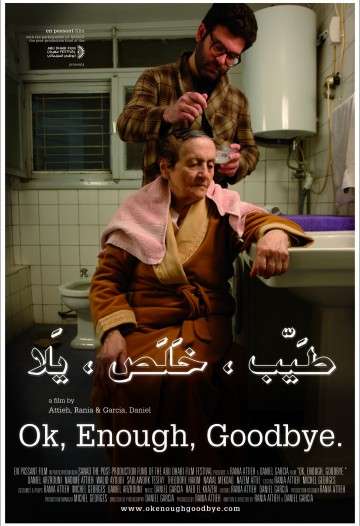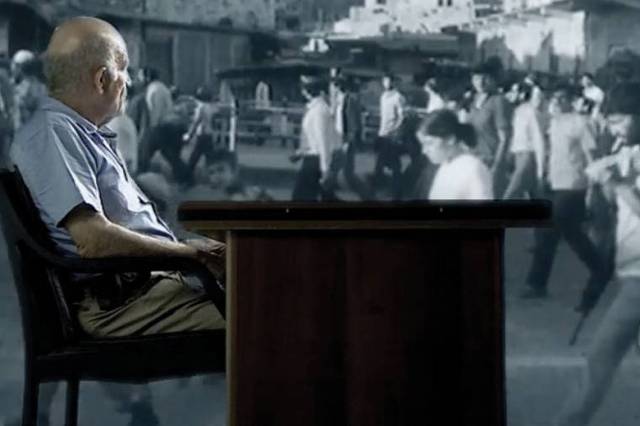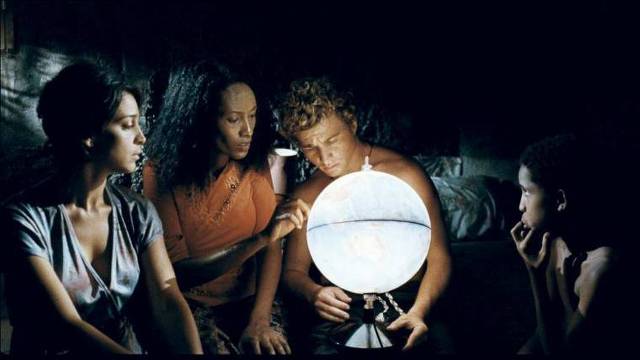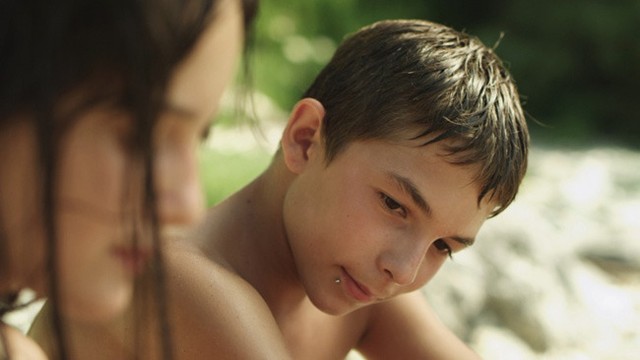-
Rania Attieh, Daniel Garcia: OK, Enough, Goodbye (2010)
RANIA ATTIEH, DANIEL GARCIA: OK, ENOUGH, GOODBYE (2010)

FILM POSTER: NADIME ATTIEH, DANIEL ARZROUNI
Man abandoned by mom
"OK, Enough, Goodbye" is a literal translation of Tayyib, khalus, yalla/طيب، خلص، يلا which is a common enough way of ending a conversation in Arabic. It doesn't mean anything special, though in English it may sound as if the speaker is fed up. On the other hand, the protagonist of this flavorful little film often is fed up, and wholly pushed outside his comfort zone. This is a coming of age movie about a forty-year-old.
Alas, poor Tripoli (Tarablis in Arabic), once a pretty town with scent of oranges wafting through the streets, now a homely, uninteresting skyline of jumbled apartment buildings shown in the opening shots of this film (with Rania Attieh's ironic travelogue voiceover), the second largest city in Lebanon, 500,000 people, mostly Sunni Muslims. Okay, Enough, Goodbye is a completely homemade film, though the short films of the couple who've made it, Tripoli-born Rania Attiah and American Daniel Garcia, have made waves at film festivals. They shot this debut feature film on HD themselves, using Attieh's familiy and friends as cast members. The result is an astonishingly real and intimate portrait of this guy who lives with his mother and the various people in his life, and of the whole homely, ordinary world he and perhaps many of the 500,000 live in.
Nobody has a name but a little neighbor's boy called Walid (Walid Al-Ayoubi). The main character played by Daniel Arzrouni is just Man, and his Mother is played by Attieh's grandmother, Nadime Attieh. Man's world is bound by the small pastry shop he runs and his day to day existence with his mother, who does the housekeeping. He has given up the idea of living independently. But one day she goes to Beirut and stays there, without warning, leaving a larder well stocked with labeled packages of food. But her son is for the first time challenged to try life on his own.
He has plenty to eat in the house, but what is he to do? His world was so circumscribed that his planned vacation in Egypt was to have been with his mother, and when she refused to go he had to cancel the trip, and was stuck with the tickets. Alone, he meets a neighboring businessman, and an old friend (Theodore Hakim), who prods him to find a woman. As the film unfolds he sees a prostitute (Nawal Mekdad), whom he meets via text messages. He hangs out with little Walid, first an annoyance, momentarily a companion, whom he takes to a closed amusement park. At his friend's urging he impulsively hires an Ethiopian maid (Sablawork Tesfay) through a slick, brutal contractor played by Rania's father, Nazim Attieh. But the maid is sullen and doesn't speak a word of Arabic.
One of the things that emerges is how maids in this part of the world are virtual slaves, kept locked in. An obvious but nonetheless richly symbolic sequence has Man adopt a caged bird when the maid escapes. Who is the prisoner here now? Another lesson is that such is the closeness of the family that living with one's mom in one's late thirties is not abnormal here, and the Man, though a bit nerdy, isn't really weird, or lacking in confidence or authority, or at least the facade of them.
The texture of the film is naturalistic and documentary, the latter effect enhanced by brief video-shot diaries in which various characters briefly talk to the camera about their lives. It is perhaps appropriate that the scenes with younger women, the prostitute and the maid, are the most uncomfortable, because Man seems unlikely to get married. Each character comes forth vividly, even the brief cameo roles. All are non-actors, well used.
The filmmakers capture the local atmosphere and the life there so well that, though not a great deal happens, this film doesn't look or feel like any other. The Man's lack of activity enhances the strong focus on place. The camera is kept unobtrusive.
Okay, Enough Goodbye debuted at the Abu Dhabi Film Festival in October 2010, and has been in five other fests through 2011. It was screened for this review at the 2012 San Francisco International Film Festival, where it is in the New Directors competition and is scheduled as follows:
KABUKI
Fri, Apr 20 6:30 pm
Sun, Apr 29 12:00 noon
PFA
Tue, May 1 8:50 pm
Last edited by Chris Knipp; 04-30-2012 at 08:28 PM.
-
Gabriel Mariño: A Secret World (2012)
GABRIEL MARIÑO: A SECRET WORLD (2012)

LUCÍA URIBE IN A SECRET WORLD
Runaway adventure
The talented young Mexican filmmaker Gabriel Mariño chooses a sexually adventurous girl's road trip across northern Mexico as the subject of his handsomely shot and engaging debut feature. María (a compelling Lucía Uribe) is 18, middle class, urban, a loner who has unenjoyable sex with random boys. It's graduation time and instead of going to the celebrations of her school, disgusted with herself, without telling her mother (Claudia Ríos), whom she keeps at a distance, she stuffs a backpack and boards a bus. The photography, which captures Mexico City's raw diagonals and the blurs of the countryside with flair, is a strong aspect of the tale. Things away from María are often fuzzy at first. She has no soulmate or girl pal to share secrets with. These she confers upon a journal with drawings and descriptions of herself in the third person. Mariño easily achieves the essential: María is clear in our eyes and we feel close to her, even though she's mysterious.
After being hosted by a chatty, poor young mother (Olivia Lagunas, excellent) whose husband has gone to the States to work, and sleeping with a man met in an all night cafe, María meets a sweet, dark young man, Juan (Roberto Mares) headed also to the States for work, the innocent lover she may have been longing for. His touchingly painful shyness is a compliment to her loneliness. This is yet perhaps too easy and obvious and her final moment reaching a dream location near the Pacific may be obvious too, but what has come before has felt too authentic and real for these fumbles to mar the whole
Mariño has experience as a cinematographer, documentarian, writer, and editor, and this shows in a strong sense of narrative and pacing and images that continually sing without being distracting: visual poetry is an essential part of any loner's experience on the road.
I liked this film a lot -- the way it slowly unearths buried emotions in its protagonist. However it has tough competition in other Latin American journey films with visual magic and more radical adventures, such as Ricardo Benet's 2005 News from Afar (whose hero is a Juan, actually called Martín, who goes in the opposite direction, to Mexico City), or Lisandro Alonso's strange, riveting Los Muertos. The voyage into strangeness and real danger is something this generation of Spanish-speaking filmmakers does particularly well. But the comparison is a little unfair and Mariño may understand his middle class girl more intimately, and Uribe is terrific.
Un mundo secreto debuted at the Berlinale in February 2012; Robert Koehler reviewed it favorably at Guadalajara for Variety in March and spoke of "excellent word of mouth combined with these [European festival screeningss]" and a Cartajena showing "set up the film for buyers on various platforms." The film is represented by Shoreline Entertainment, Los Angeles for International sales. It was screened for this review as part of the San Francisco International Film Festival (April 19-May 3, 2012), as part of the New Directors series. SFIFF showings at the PFA (Berkeley) and Film Society Cinema and Kabuki (San Francisco) are as follows:
PFA
Sun, Apr 29, 2012 3:20 pm
FSC
Mon, Apr 30 6:30 pm
KABUKI
Wed, May 2 6:00 pm
Last edited by Chris Knipp; 04-21-2012 at 12:34 PM.
-
Ra'anan Alexandrowicz: The Law in These Parts (2011)
RA'ANAN ALEXANDROWICZ: THE LAW IN THESE PARTS (2011)

STILL FROM THE FILM
Justifications for injustice? Israeli judges on trial
This winner of the Sundance World Documentary prize, made by Ra'anan Alexandrowicz, produced by Liran Atzmor, offers an insider’s view of the logic, structure and moral cost of Israel’s parallel mialitary legal system governing Palestinians under occupation by means of the Israeli army or Israeli Defense Forces (IDF). Interviews with the men who create and uphold these laws, artfully juxtaposed with archival footage, call into question concepts of justice as held in the State of Israel. How long can you live with a double standard?
The filmmaker, Ra'anan Alexandrowicz, explains that people originally said his subject was important but too dry; that he should write a book; or, they'd suggest, nowadays doesn't one create a website? He answered that the reason is eyes -- which a film uniquely affects. He quotes Arondati Roy's saying, "Things once seen cannot be unseen." He also explains that he knows he was right to make a film from faces he sees at Q&A's after his film is shown. He sees "a certain and very specific look in their eyes – a look that seems to say to me, “I wish I hadn’t seen your film. I wish I never came.” This in a sense is what making documentary films is all about. Alexandrowicz says his material is "theoretically there for people to see," but "completely hidden from society's eye." The material in this film might be called, reversing Rumsfeld's famous hairsplitting, an example of the unknown known. Israelis are often blissfully unaware of what goes on in the West Bank and Gaza and judges ignored or disregarded the injustices of which they were a part.
The "occupied territories" -- the Palestinian lands seized by Israel during the 1967 war and never returned -- were put under "temporary" military control, so all civilian crimes committed there are tried by military court. Residents in the territories remain non-citizens, and so this "temporary" system, after 45 years, maintains their Kafkaesque state of servitude.
In the story this film tells, one Israeli Justice, Meir Shamgar emerges as key. He is a retired Brigadier General who devised legal cover to in order to confiscate Palestinian land and turn it into Israeli settlements. After doing this, he afterwards presided on the Israeli Supreme Court, thus controlling the only point of ultimate appeal for Palestinians against what his setup allowed to be done to them. Also important is Zair Ramati, a judge who, with the ingenuity of a Talmudic scholar, suggested to Ariel Sharon the Ottoman Empire law of "dead lands" as a way of getting around an Israeli Supreme Court ruling against a Jewish settlement. Alexandrowicz found that in the case of the Israeli settlers, neither military nor civilian law was enforced when it came to aggressions and attacks on Arab property, even in cases of manslaughter or murder. If ultimately the Supreme Court ruled against the Palestinians every time, what value has law or justice in Israel, for the occupied? None; but the Supreme Court's abiilty to hear petitions from Arabs has helped legitimize the occupation in the eyes of the Jewish popularion. But what meaning does the word "democracy" have as applied to the country that has the legal disparities? The most candid of the judges questioned former military judge Jonathan Livny says, in a climactic moment of the film, "You serve a system." Livny adds: "It's an unusual situation. As long as it's temporary, fine. But when it goes on for 40 years? How can the system function? How can it be just?"
The art of Alesandrowicz's film is the way it juxtaposes its carefully collected testimony with other images such as Israeli destruction of Palestinian houses. He poses his legal witnesses on a high dais as if in a courtroom with a large green screen behind them on which he projects such images as they speak. They sometimes turn around to look at them. This creates a theatrical and sometimes ironic effect. The filmmakers are shown assembling their set to start off, furthering the Brechtian effect. Alexandrowicz continually acts as Devil's advocate in questioning the retired judges. But he must be polite. He must keep them from walking out.
On the film's Facebook site, an Arab contributor, Dunya 'Alwan, quotes the film's tagline, "Can a modern democracy impose a prolonged military occupation on another people while retaining its core democratic values?'" and comments, "Is this a joke? I hope so!" And this is the fundamental issue, starker than any of the various morally dubious events that have occurred in US history due to the length of time and the smallness of the country and the centrality of its fundamental conflict with the region's other occupants. But how strongly does Alexandrowicz pose this issue? He is speaking as one who is still asking that question that Dunya 'Alwan regards as ludicrous. This is his limitation.
Another trouble with the film, which Alexandrowicz freely acknowledges from time to time as part of his Brechtian approach, is that, while the overextended Israeli occupation's illegal legal system (which contains various laws and practices contrary to international law) is certainly manipulative, so are the cinematic methods in The Law in These Parts. But if he is manipulative he is also meticulous in the research behind the questioning and the questioning itself, and that makes this an informative film. It is a little bit too self-conscious at times, but given the seriousness of the subject, that is understandable. One leaves it more aware of the limitations of "justice" and the courts. Despite its acknowledged faults, this is a brilliant and moving piece of work.
In addition to Sundance, The Law in These Parts/Shilton Ha Chok won the documentary prize at the Jerusalem Film Festival (July 13, 2011). It was screened for this review as part of the San Francisco International Film Festival (April 19-May 3, 2012), where it is showing at these times:
PFA
Wed, Apr 25 6:30 pm
KABUKI
Sun, Apr 29 6:15 pm
Tue, May 1 2:30 pm
Vimeo excerpt from the film.
Last edited by Chris Knipp; 07-23-2014 at 07:29 PM.
-
Ramona S. Diaz: Don't Stop Believin': Everyman's Journey (2012)
RAMONA S. DIAZ: DON'T STOP BELIEVIN': EVERYMAN'S JOURNEY (2012)

NEAL SCHON AND ARNEL PINEDA IN DON'T STOP BELIEVIN': EVERYMAN'S JOURNEY
A Google/YouTube discovery leads from obscurity to fame
Most of the time, when he's not looking exhausted, Arnel Pineda has a big, wide smile on his face, and stars in his eyes. And for good reason. He is living a dream you can hardly believe. He certainly hardly can. Originally a performer in an obscure cover band in Manila, the Philippines, in 2007 he was plucked off of YouTube via Google, Justin Bieber-like, to become the lead singer in the über- famous rock group, Journey.
For Arnel, it was a long journey to Journey. And Pineda, now "like Elvis Presley for Filipinos" in any city they go to, as a liaison guy for the band says, is no Justin Bieber. No kid, he's 44. Can he even handle the life of a big band on tour, performing in arenas filled with eighteen or twenty thousand people?
This music doc suggests that he can. He's survived the school of hard knocks. Arnel became the family support -- with his singing -- after his father died at the age of 12. He used to sleep in the park with the homeless kids. He went through relationships, failed attempts to make it with his own music, punishing stretches drugs and alcohol, and fifteen years of living in Hong Kong. He had given up. When Journey leader Neal Schon contacted him, he could not believe it. But the fact is he has a fantastic voice and tremendous command of it -- and of the Journey repertoire. Addressing experienced documentarian Ramona S. Diaz in a mixture of English and his native language, Arnel turns out to be smart and articulate. His description of all the feelings and states he went through in the minutes leading up to his first performance in a concert with Journey, in Chile (before eighteen thousand) is worthy of a good novel.
As we follow him through what seasoned original band members say is the longest, most intense tour ever, Arnel shows poise and class and is unfailingly graceful and warm. Despite encountering some racism the new lead singer has livened up the band, made it more international and yes, despite his age, injected some youth (he was, after all, only six when the original members formed the group).
Like many music docs, this one basically just follows its subject around. Don't Stop Believin' (the title from one of Journey's biggest hits) is a heartwarming tale. It does not ring changes on the genre, and it goes on a little too long. After many music docs from the Beatles and the Stones through Neil Young and Metallica, Journey does not emerge as the most interesting of bands, but its fans might differ with that. A poll rates it the fifth most popular American rock group ever, The crowds -- even in the recession -- are enormous. Its members earn millions. Question is, will Arnel's private life and family survive this fame and fortune?
The film features the current Journey band members Neal Schon, Jonathan Cain, Deen Castronovo, Arnel Pineda, Ross Valory, shown in performance in many venues, including the Philippines. Cinematography is by Julia Dengel and Vincente Franco.
Don't Stop Believin' was shown at Tribeca Apirl 19 (the premiere), and April 21, 27 and 28, 2012. IIt will be the closing night film at the San Francisco International Film Festival, showing Thu, May 3, 2012 at 7 pm at the Castro Theater.
Don't Stop Believin' finally got US theatrical release the week of March 8, 2013.
Last edited by Chris Knipp; 07-23-2014 at 07:32 PM.
-
Emanuele Crialese: Terraferma (2011)
EMANUELE CRIALESE: TERRAFERMA (2011)

DONATELLA FINOCCHIARO, TIMNIT T., FILIPPO PUCILLO, RUBEL TSEGAY ABRAHA IN TERRAFERMA
Trouble going and coming for an Italian island
Crialese's new film Terraferma focuses on the Italian island of Lampedusa southwest of Sicily, where fishing and tourism are the chief livelihoods, both under threat. Fishing is losing its commercial viability while tourism, though it has been on the increase, is threatened by the constant arrival of desperate African illegals by sea.
Focusing on a family, particularly the discontented mother Giulietta (Donatella Finocchiaro) and her immature 20-year-old son Filippo (Filippo Pucillo), Terraferma is touching and disturbing but tries to do too much. The Roman-born, Sicilian descent filmmaker seems to feel obligated to focus equally on family conflict, local financial ills, coming-of-age turmoil, legal pressures from the government, clashes between public law and the seaman's code, the effect of young posh tourists from the north, and the heartrending plight of African illegals who are allowed to drown or sent back home. Dealing with all these topics at once only lessens the emotional and artistic impact of the whole. Despite some memorable moments, Terraferma's too many threads make it wind up feeling like several episodes of a TV series.
Things begin when granddad Ernesto (impressively bearded Mimmo Cuticchio) and Filippo find their decrepit fishing boat disabled, its propeller bent, after it runs into the broken pieces of a small vessel from Libya. Back on the island, the recently widowed Giulietta wants to emigrate to the mainland, but in the meantime clears out and repaints the house to rent it to summer tourists and moves herself and Filippo into the garage next door.
Filippo becomes enamored of the girl from Milan who rents the house with male pals from Arezzo and Padova, whom he tries to entertain. But his clumsy efforts to assert himself and expand his horizons are soon overwhelmed by bigger issues when the family fishing boat is overrun by Afrians overflowing a small raft. The Coast Guard advises Ernesto to stay in he area but ignore the Africans, but the law of the sea requires Ernesto to save a pregnant Ethiopian mother (Timnit T.) and her small boy (Rubel Tsegay Abraha), whom the family hides, much to the disapproval of Giulietta, especially when the mother immediately gives birth. But Giulietta is ambivalent, angered by the Ethiopians but also protective of them. Meanwhile the family tries to keep all these hassles from the three young renters of their house.
The family's attempt to juggle their various conflicting priorities could serve as a metaphor for Crialese's own dilemma in groping to deal with multiple issues in his movie. There is the drama of the older men's dying fishing trade and issues over the boat's licensing, which heightens their conflict with the Coast Guard over treatment of the illegals. There is Filippo's sometimes touching coming-of-age drama -- and it is Filippo who comes closest to owning the film. Sicilian-born and an actual Lampedusa resident, the actor Filippo Pucillo contributes strong presence and authenticity (if not much subtlety) to the movie and he has the local patois down. There is the pathos of the illegals themselves, heightened (to excess) by the Ethiopian mother, headed, she hopes, for Turin to be reunited after five years with her husband, but saddled now with an illegitimate baby. There is the conflict over whether to save Africans or let them drown and thus save tourism and a little bit of the fishing trade. Even the young tourists get their moment when there is focus on the three young people temporarily renting the family house. An attempt to smuggle the three Ethiopians off the island becomes the final focus, but it's several desperate acts by the confused and immature Filippo that contain the most drama.
Jay Weissberg of Variety lays out the shortcomings of this tumultuous but disappointing movie frankly in his review's lead paragraph: "A changing world drives Italian fishermen to leave their island at the same time African immigrants risk their lives to get there in the unchallenging social drama Terraferma," Weissberg writes. "The kind of pic that lays everything out nice and neat so auds can easily digest the arguments and feel good about themselves for not wanting people to die," he went on, "this is a well-made movie with no pretension but also no crying need to be at a major film festival. Arthouse auds expecting something along the lines of Emanuele Crialese's previous works, especially the superb Golden Door, will be disappointed."
"Nice visuals, nice story, nice everything -- but sometimes nice just isn't enough," Weissberg concludes. He comments that Fabio Cianchetti's "lensing is always superficially attractive" -- one longs for something more. Crialese's command of the atmosphere and flavorful personalities of the island is undeniable, but the movie never takes hold of a distinctive style or mood -- as Golden Door most definitely did. Terraferma might be contrasted with Philippe Lioret's 2009 Welcome (Rendez-Vous 2010), another treatment of the European illegal immigrant issue. Welcome focuses on a boy from the Middle East and the French local (Vincent Lindon) who hides and protects him and tries to help him go north without detection from the authorities. The issues are strong and clear and the movie really sings because Lioret keeps it simple, focused on the two characters. Terraferma is not selective enough. Its sometimes in-your-face closeups underline its capacity to grab our attention but not to hold it for long on any one thing.
Terraferma debuted at Venicie and has won various awards. It received three Donatello nominations, Best Film, Best Director, and Best Actress. It was Italy's candidate for the 2011 Best Foreign Oscar (not nominated). It was shown at Toronto and over a dozen other festivals. It has been released in half a dozen countries, including France, where it received moderate reviews (Allociné 3.2). The lively treatment of serious social issues arouses favorable comment, but the all-over-the-map treatment leads to the inevitable demurrals. Screened for this review as part of the San Francisco International Film Festival (April 19-May 3, 2012). SFIFF showings were April 21 at the Kabuki Cinemas and April 23 at the Film Society Cinema.
Last edited by Chris Knipp; 07-23-2014 at 07:36 PM.
-
Rolando Colla: Summer Games (2011)
ROLANDO COLLA: SUMMER GAMES (2011)

ARMANDO CONDOLUCCI IN SUMMER GAMES
Childish parents, cruel children, bad vacation
Here's an up-to-date Italian movie for you: the two little boys at the summer campground listen to Jusin Bieber to drown out the fighting of their working class parents. If only the proceedings were otherwise more original. The kIds' doings are lively and well-filmed; it's their parents' constant fighting that is a drag and a bore. In the daytime, feisty young Nic (Armando Condolucci) and little brother Agostino (Marco D'Orazi) -- is his name an ironic reference to Moravia's early novella? -- play around a farmer's shack they've found with two girls who are of more middle class background and are Swiss-Italian, like the director. The girls stay in cabins with walls instead of a tent. There's also an Asian kid, Lee, (Francesco Huang) who admits during a truth-or-dare game that he's ashamed of his dad for not being able to speak Italian; but he's the local kid. (His chance to shine -- a memorable moment, one of the few -- is when he shows the bigger girl how to dance sexy. For a minute we're in a Wong Kar-wai movie, or something. ) The girls are from an Italian-speaking part of Switzerland and the boys are from Rome. If the title's a reference to the French classic Forbidden Games, then Nic and Agostino's parents' fighting takes the place of the real war of the Forties. It's a big comedown, and a bummer.
But it's not totally inaccurate. Anyone with some dysfunction in their family history (and this one is a continual train wreck) remembers vacations when a sense of abandonment, abuse, and trauma was heightened because everyone was supposed to be having fun. Summer Games captures that ache of good times being continually spoiled by emotional pain and games becoming twisted because of acting out.
Another problem, though: the young actors are appealing enough and the cinematography by Lorenz Mer sparkles, but this is the work of a committee, five writers, and the writing accordingly lacks distinction.The parents never emerge as original characters. Nobody does, except maybe Nic, whose coming of age gets a lot of static here no Justin Bieber song can block out. Nic seems to be unwillingly taking on the violence of the father he hates. Nic's would-be sweetheart is Marie (Fiorella Campanella), who has her own preoccupation -- a missing father whose absence her uptight mother (Roberta Fossile) can't bear to explain. Nic's capable of love but tends to express it more by by beatings and masochism than kisses. He does get his moments of closure (for Marie) and sweetness (with Marie) toward the end, though. The committee is kind enough to provide those, in a setting that recalls Antonioni's L'Avventura. We get all these tasteful, classy references. But unfortunately they're just reminders that this isn't that great a movie.
Probably this film was included in the San Francisco International Film Festival because it was the Swiss entry in the Oscar Best Foreign competition -- but the Switss rarely come up with a memorable film. It was shown before, starting in August 2011, at Venice and Locarno and a few other festivals, and opened in France (as Jeux d'été) in early February 2012, to poor press (Allociné 2.8, with few reviews).
Giochi d'estate plays in the SFIFF twice:
KABUKI
Mon, Apr 30 3:00 pm
Thu, May 3 7:30 pm
Last edited by Chris Knipp; 07-23-2014 at 10:08 PM.
-
Johnnie To: Life Without Principle (2011
JOHNNIE TO: LIFE WITHOUT PRINCIPLE (2011)

Greed everywhere, solemnity nowhere
Life Without Principle shows the prolific Hong Kong pop director Johnnie To at less than his best as he gets carried away with pursuing a theme of today's near universal venality. There's a slapdash quality, and the focus on banks and balance sheets will disappoint fans of To's high-speed violence, nearly totally lacking here. There's hilarity, though, and plot-lines galore juggled with undeniable skill in the crude depiction of greed in not only money lenders, banks, and crime bosses, but minor financial employees -- even an old lady, willing to risk her life savings to make a quicker buck. Filmgoers who would like to see more serious and elegant treatment of the going south of global finance will do better to watch J.C. Chandor's Margin Call or Charles Furguson's documentary Inside Job.
The over-plotting is in itself hilarious, and To and his team are good enough to keep the main threads vibrating and clear. I won't try to outline them, but suffice it to say there's a cop with a dying dad whose wife wants to buy an apartment; a gang fixer who gets mixed up with a crooked investor; a moneylender who leaves a big sum in the office of a young female bank employee. Without Principle tracks three sets of characters over a three-day period depicting them in separate chronologically overlapping blocks, Pulp Fiction style, with the Greek debt crisis causing global stock market collapses on the third day, leaving in this version only the very lucky ahead. The bank employee is Teresa (Denise Ho), who lets the old lady (So Hang-shuen) dump her savings into the high-risk fund and finds the cash of the crooked loan shark (Lo Hoi-pang) left in her care, unregistered (and then he gets offed in the parking garage). There is also the cop, Inspector Cheung (Richie Ren), who has a bomb scare and a killing to deal with besides the flat purchase and his father's impending demise from esophageal cancer,, but seems a perfunctory anchor to the story compared to the gangland toady, Panther (a very energetic and appealing Lau Ching-wan), and his cohort Lung (Philip Keung), who loses a fortune of his boss's money on the futures black market.
In the delightfully buffoonish finale (or one of them) Lung, with a long needle in his chest, drives Panther (yes, the stabbed man is the one at the wheel) to reinvest for him in a bet on the downturn, but Panther is a newcomer to the stock market and in his befuddlement bets instead on it going up -- with surprising results. Inspector Cheung and his wife get a surprising windfall. The old lady -- well, she was just foolish, wasn't she?
This amusing film takes some of the key issues of our time and grinds them up into a complicated farce-cum-actioner. It's something of a paradox that what should be a stunning rebuke of current morals and an engrossing story is more just a hundred minutes of fairly mindless fun. Though the movie is slapdash, it also has many signs that its maker is an old pro -- if one with too much of a bee in his bonnet and past his prime. This is one more sign that the glory day of Hong Kong actioners are over. The way the intricate plot is kept propulsive and clear arouses admiration, but (using the Pulp Fiction comparison as a standard of true originality) it's also too clichéd and generic in details to take seriously as economic commentary. And it's not gloomy, gangsterish, or violent enough to be a true crime thriller.
Life Without Principle, Chinese title 夺命金, "Deadly Gold," debuted at Venice in 2011 (see the Variety coverage by Leslie Felperin for more detail) and also shown at Toronto, San Sebastian, and Pusan. It was screened for this review at the San Francisco International Film Festival (April 25, 2012). To's 2009 Vengeance, improbably but engagingly starring Johnny Halliday, was a part of SFIFF 2010. I reviewed To's Triad Election] as part of the 2006 New York Film Festival. Triad Election's elegant moodiness and scary violence belong to a different, and to the genre fan, better world.
Also shown at the SFIFF Sun, Apr 29, 2012 at 9:15 pm at the Kabuki Cinemas fest headquarters.
Last edited by Chris Knipp; 04-26-2012 at 12:07 PM.
 Posting Permissions
Posting Permissions
- You may not post new threads
- You may not post replies
- You may not post attachments
- You may not edit your posts
-
Forum Rules





 Reply With Quote
Reply With Quote






Bookmarks